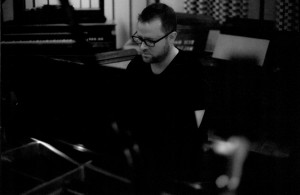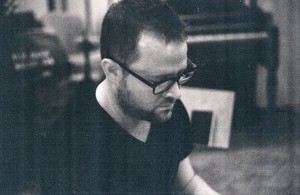 On his debut album as Memorybell, Grant Hazard Outerbridge delivered an abject lesson in need versus want. Obsolete is more than a simple minimalist document, indeed it could be argued that Outerbridge’s deft touch and innate sense of time make each of its sparse notes laden with import. As if each successive strike of hammer on piano wire were the only thing in the world… until the next. So it’s no surprise that Outerbridge is as much a thinker as a “feeler” when it comes to his musical work. In this utterly engaging interview the lovely Wagner Hertzog sat down with the artist and covered everything from Marvin Gaye to transient global amnesia. A truly great read.
On his debut album as Memorybell, Grant Hazard Outerbridge delivered an abject lesson in need versus want. Obsolete is more than a simple minimalist document, indeed it could be argued that Outerbridge’s deft touch and innate sense of time make each of its sparse notes laden with import. As if each successive strike of hammer on piano wire were the only thing in the world… until the next. So it’s no surprise that Outerbridge is as much a thinker as a “feeler” when it comes to his musical work. In this utterly engaging interview the lovely Wagner Hertzog sat down with the artist and covered everything from Marvin Gaye to transient global amnesia. A truly great read.
Many thanks to Wagner and Grant for their time and efforts in making this happen.
WH: You have been playing music for decades. Was the concept for Memorybell already in your mind before you started working on this music, or is it a more recent artistic project?
GHO: Memorybell is a very recent project. I wanted to focus on ambient music following the release of Genus Euphony, but the way this album came into being was decidedly unplanned.
I had been composing, shaping, and reshaping 20 or so songs but could never quite get them to feel the way I wanted them to. After I got out of the hospital, playing the songs was a uniquely unpleasant experience. They sounded awful to me and I had trouble remembering why I had written them in the first place. When a song felt wrong, I either threw it away completely, or focused exclusively on its essence (often just one or two chords) and explored that as granularly as I could.
My close creative collaborator from The Very Hush Hush, Peter Bo Rappmund, had heard most of the songs in various stages of their composition. When I was able to play these new, post-amnesia versions for him he strongly urged me to release the record under a new name. The songs were so different from anything I’d ever recorded that it made sense that they be the start of a new project.
WH: What are your main influences and sources of inspiration?
GHO: It sounds odd, but a lot of my musical ideas come from mundane objects. There is a particularly pleasant sound that the metal vent in the roof of my house makes when it lightly rains outside. In my old neighborhood, there was an old row house whose laundry exhaust whistled beautifully whenever it was in use. I could listen to the sounds of an oscillating fan all day long.
I enjoy sitting still and listening to the world, though it’s far too loud for me. This is one reason why I’m drawn to expansive silences. I draw an immense amount of inspiration and solace from the quiet that descends during a snowfall.
Less esoteric and more to the point, I find the following works very influential (in no particular order):
Marvin Gaye – What’s Going On
Air – Moon Safari
Billy Holiday – Solitude
Gas – Pop
Yo La Tengo – And Then Nothing Turned Itself Inside-Out
Stars of the Lid – The Tired Sounds of Stars of the Lid
WH: You seem interested in exploring extreme minimalism in your music, creating a slow, surreal experience for the listener. How did you come to develop such a style?
GHO: When I was studying classical music I was most attracted to dissonant passages. These “sour” notes and chords represented for me a warmer, more interesting way of approaching musical expression. I would sit for hours playing a single passage over and over, slow it down, and make subtle changes to it. As I grew older, I looked forward to this monastic repetition far more than completing whichever increasingly difficult piece of music I was learning.
Starting in the early 2000s, I played bass in The Very Hush Hush. Like the piano, my method of approaching the bass has changed over the years but, even back then, I was more concerned with playing the most interesting note than playing the root. One well-placed note can heighten anticipation in ways little else can.
My ears most want to hear what happens in the moments after a note is played before it dissolves into silence. That tension is powerful and shaping that tension is my primary concern.
WH: In terms of your creative processes, are you driven by your technique, or do you let your emotions drive your composing and arranging? Or is it a combination of both?
GHO: Emotion is the driving force behind my music.
To my ears, technique is only as useful as one’s ability to use it to express emotion. Technique for its own sake does little for me. It’s not that I don’t admire accomplished musicians, I do; I fully understand the time and dedication it takes to become an accomplished musician. But when technique becomes the focal point music becomes hollow. There is a whole spectrum of emotional experiences to be had while listening to music and feeling awe at someone’s ability is only one.
When I compose a new song, I try to keep my mind blank. Turn off my brain. Focus on what I’m feeling and sensing. What do I hear? What do I smell? Taste? I often begin with my eyes closed and open them once something interesting has presented itself. From there, repetition and manipulation of time and silence. How best to amplify what I’m feeling in the moment? What is the simplest way to say what needs to be said?
WH: Is there is a special place or time that you write music?
GHO: There used to be, but now I’m restricted to when my toddler son is either asleep or out of the house. Otherwise, he’ll come bounding from wherever he is and start mashing the keys. Adorable and amazing, but not conducive to thoughtful creation. I’m lucky if I get an uninterrupted chunk of 20 minutes per day.
 Place is an interesting problem with the piano. You’re stuck wherever the piano is. My work around for this used to be scribbling ideas in a notebook, studying them when I couldn’t be at a piano, etc. Now, unless I’m particularly inspired and one of my 20-minute mini-sessions produces something more-or-less fully formed, I’ll hold a strong phrase in my mind for as long as I have to until I have time to explore it at the piano.
Place is an interesting problem with the piano. You’re stuck wherever the piano is. My work around for this used to be scribbling ideas in a notebook, studying them when I couldn’t be at a piano, etc. Now, unless I’m particularly inspired and one of my 20-minute mini-sessions produces something more-or-less fully formed, I’ll hold a strong phrase in my mind for as long as I have to until I have time to explore it at the piano.
This results in a kind of fermentation. The most emotive part of an idea tends to become stronger, while the less necessary, more ancillary bits float off. This won’t always be my song writing process but, considering my 2 year-old just had a baby brother, I don’t see it changing in the near future.
WH: How do you work on individual songs? Do they keep evolving as you experiment with them over time, or do you find it quick and easy to finish each piece?
GHO: It depends on the song. Many songs are vague and gauzy at the start and I have to sit with them for a while before they reveal themselves to me. I try not to force anything onto them, just wait for whatever emotion it was that drove me to sit down at the piano to come out. Sometimes this process is quick, other times it is glacial. It took 14 years for ‘Somnolent’ to become what it is.
That’s an aberrant example, though. Most songs take on average 2-3 years before I finally leave them be. So, at any given time, the batch of songs I’m working on tend to have been initially conceived several years previous.
Occasionally, a song will emerge and I can’t figure out how to improve it. Those are always happy moments, though infrequent. I quite enjoy the long, slow evolution of a song. When one is finished, it may sound quite unlike it did in its infancy.
WH: In regards to your artistic process, are you a perfectionist, or more of a relaxed creator?
GHO: A complete and utter perfectionist, though I’m trying to let that go. My compromise is to direct my perfectionist tendencies toward my process rather than toward my music, to stay dedicated to giving the songs room to breathe, to grow, to change. Rather than try to force the songs to be something I want them to be, I allow them to be what they are. Even if I don’t like the end result, being true to the process feels like being true to my nature.
The most important part of my process is letting go. Ego can be a useful tool, in crafting personae, in pushing yourself, but I find it a barrier to making meaningful music. My best songwriting comes after I’ve processed whatever drove me to write a song in the first place. What remains after the dust settles.
WH: Silence, and the ambiguity it evokes, plays an important role in your music. Is this aspect of your music planned, or do you improvise?
GHO: Very much planned, as much as one can plan silence. I can never predict the affect any given length of silence will have, so I conduct tests. Do I add a single beat here? A measure of seven? Thirteen? It’s a little like introducing oneself to a strange animal.
As consumers of popular music our ears have been trained to expect predictability in regards to rhythm. 4/4 and 3/4 dominate the sonic landscape. The ghost of the Western classical music tradition is persistent. The purposeful shirking of predictable time signatures is a good thing but if not approached carefully it can estrange the casual listener.
When I shape the silence in my songs, I pay close attention to what my ears want. Then I give them something else. Unusual time signatures often do the trick, but I try not to employ them for their own sake. Sometimes a standard time signature alternated with an irregular or changing amount of silence has a magical effect. The ultimate test is if someone can’t tell that a song is in 17/8 or 13/4.
The ideal is to make the unexpected feel natural.
WH: Can you tell us about your experience of transient global amnesia and how it influenced the creation of this album.
GHO: In late February of 2014 my first son was two weeks old. He was curled up with my wife on the couch and I left to meet up with some friends. We had a couple of beers and I made my way home. It was lightly snowing.
I walked in the house and my wife and son were still curled up on the couch. I took my son upstairs, swaddled him and put him in his crib, and put on my headphones.
 I woke up in a hospital roughly ten hours later on a gurney, obscenely bright fluorescent lights flashing over my face. I saw my wife and asked, “What am I doing here?” She patiently recounted the story of how I had come into our bedroom saying I couldn’t remember where I had been, what I had done, the people I had been with; how she had called the police, to whom I had apparently been quite charming and funny, who in turn summoned an ambulance that brought me to the hospital.
I woke up in a hospital roughly ten hours later on a gurney, obscenely bright fluorescent lights flashing over my face. I saw my wife and asked, “What am I doing here?” She patiently recounted the story of how I had come into our bedroom saying I couldn’t remember where I had been, what I had done, the people I had been with; how she had called the police, to whom I had apparently been quite charming and funny, who in turn summoned an ambulance that brought me to the hospital.
My poor wife told me this story over forty times before it stuck. Tests were run; EKGs, MRIs, CAT scans, toxicology screens. At one point, a group of medical students with clipboards surrounded my bed.
Throughout it all, my wife sat holding our absurdly small son wondering if I’d had some sort of stroke.
I was diagnosed with Transient Global Amnesia, which is, maddeningly, a diagnosis by exclusion. Once everything else has been ruled out, that’s what you get, a rare condition about which little is known. Extreme stress, sleep deprivation, and excessive physical exertion are thought to be the triggers.
The effect was as if a bomb had gone off in my brain. All memories months into the past and future were turned to glass.
The tests showed an increased sensitivity to light and sound. This proved problematic with a small baby at the house. I was given to carrying earplugs and noise-cancelling headphones with me for diaper changes. Going outside without sunglasses triggered a migraine. A screaming police siren triggered a migraine. A teakettle triggered a migraine. A loud sneeze triggered a migraine.
I quit my job. The thought of trudging through that soulless routine coupled with my new condition caused me so much anxiety I couldn’t function.
I was home all the time. When my son was sleeping, I had to do something. When my son was at day care, I had to do something. When I couldn’t sleep, I had to do something. I turned to the piano.
The songs I had been working on for the previous few years sounded like boxes of broken glass. Some of them literally gave me headaches. To heal, I picked them apart, focused on the parts that were soothing, that felt right, and threw out what remained. I reshaped them, let them ring out into silence, and created something new.
WH: Did you know beforehand that you were writing songs specifically for this album, or did you choose from songs that had already been written?
GHO: I chose from songs I had previously written, but completely altered them, post-amnesia. I had a concept for an album I had been pursuing before I awoke in the hospital. That’s the raw material to which I returned
At the time, it was important to me to force the issue, to make the collection of songs work even if they felt wrong. That’s when I really started focusing on silence. I threw out the superfluous, ornamental bits and chiseled the songs to their core. Then I wrapped them in silence.
WH: The title of the album, Obsolete, is very evocative. How did you settle on this title, and what does it mean to you?
GHO: I really don’t like titling my own songs. When I do, they’re almost always non-sequiturs. I reached out to an old friend, gave him the raw, un-mastered tracks and asked him to title the songs. He suggested the title track be named “Requiem for Obsolete Technology.” A great song name, to be sure, but I felt single word song titles were more apropos, given my editing method and interest in silence.
 In general, I often feel like I was born a couple hundred years too late. The world is the loudest it has ever been, and for someone who craves quiet it is a struggle to remain focused amongst the head-splitting sounds of squealing brakes, screaming people, crackling electric lines, and wailing sirens. I like to imagine what the world must have sounded like before the industrial revolution.
In general, I often feel like I was born a couple hundred years too late. The world is the loudest it has ever been, and for someone who craves quiet it is a struggle to remain focused amongst the head-splitting sounds of squealing brakes, screaming people, crackling electric lines, and wailing sirens. I like to imagine what the world must have sounded like before the industrial revolution.
Actually finding a quiet place is becoming more difficult. I live in Denver, Colorado and the legalization of marijuana, along with our city’s policy of being as inviting as possible for new businesses, has created an immense influx of people. City streets are jammed beyond capacity, and what used to be an easy drive into the mountains has become an arduous chore. Hiking trails are as clogged as motorways. Landmarks are being vandalized.
Quiet places are vanishing. So I create them in music.
WH: Did you work on the songs for Obsolete individually or collectively? The titles of the songs suggest a link between them.
GHO: The songs I ended up including on Obsolete were originally written at completely different times. The only thing they had in common was the fact they were the ones I had been drawn to in the years and months leading up to my amnesia. When I slowed them down and picked them apart after my return from the hospital, I noticed new patterns and arranged their order on the album accordingly. I rarely worked on one song at a time. I typically shaped the whole set of songs at once. If I made a severe edit on one, it often let to a complementary edit on another.
I touched on this earlier, but I find naming my own songs difficult. My natural inclination is to be abstract and sarcastic with names, but I felt it would be a disservice to the honest and existential nature of these songs to name them so. The titles of the songs are representative of various themes that were woven through my life when I reworked them. Koan is inspired by the Richard Brautigan poem, “Karma Repair Kit, Parts 1-4.” Ambulator is in reference to the Max Frisch novel, Man in the Holocene.
Both of these speak to me on a level that is difficult to articulate. “Karma Repair Kit” is a reminder to be still and accepting. Not of anything in particular, but of everything in general. Man in the Holocene is a meditation on loneliness and struck a note within me during my recovery, despite the fact I read it a very long time ago; it just bubbled up out of my mind.
The other song titles are fairly literal and loosely based on my friend’s suggestions. 2014 was unequivocally the worst year of my life. The amnesia wasn’t even the most difficult struggle, but I’m not going to elaborate. The songs are my way of processing what happened.
WH: What’s the main intent behind your music? What are you trying to communicate to your listeners?
GHO: That sitting still, especially when it is uncomfortable, is important; that the act of listening, whether it’s active or passive, is important. It slows down your thoughts, so you can spend time with them. Depending on your type of mind or life situation, that may not be desirable, but then it is all the more impactful.
Modern city life is fast and loud. We run around from place to place, from work to home, from the gym to the grocery store, checking our watches or phones, making sure we don’t miss appointments; little of that matters to our internal lives. We focus so intently on what we have to do that we rarely stop to think what we would like to do. Or what we should do, not only for our own happiness but also for our own mental health.
Slow down and take a nap. Memorybell can help.
WH: Do you have a lot of unreleased songs?
GHO: I rarely make a proper recording until I’m satisfied that I have a cohesive collection of songs. I have a few songs that didn’t make the cut for Obsolete, but if I do anything with them, I’ll probably chop them up and use parts of them in another project. I’ve reworked one song that didn’t fit the way I wished it had for Obsolete and will most likely include it on the next record.
I don’t have a lot of unreleased material but I do, however, have a lot of unrecorded material. I don’t write any musical ideas down, I just run the songs through my head over and over. I have several albums worth of songs in various stages of completion floating in my brain. Sometimes I’ll carry a song around for years before I return to it. One song I’ve been working on for 19 years and it still hasn’t fully revealed its mysteries to me. My approach is that if something is worth recording, I’ll remember it. Thankfully, the part of my brain that stores my musical ideas seems largely unaffected by my amnesia.
WH: Are you currently working on something? What can we expect next from Memorybell?
GHO: I’ve had my fill of reworking old material for the moment. I’m moving forward with my new approach and writing an album from scratch. It’s very freeing, and my process has quickened; I’ve let go of thinking of any given idea as precious, as worthy of meticulous appreciation. If something doesn’t feel right, it’s gone. If some essence of it sticks around, then it has merit and will find a place in some different form. It’s a looser and faster method than I’ve ever used before. I’m halfway done with the follow-up to Obsolete. The songs still breathe slowly and are still melodic, but it’s somehow…different.
 My main obstacle is lack of time. I have a 2 year-old and a newborn at home (both boys) and, unlike when I wrote Obsolete, I am now gainfully employed. My time to write is limited to naptime, or those rare occasions when I’m home alone. I’m finding it helps, actually. I carry around the songs in my head, tweak them, try different arrangements, and then when I finally have the time to play them and test my ideas out, the good ideas tend to present themselves more or less immediately.
My main obstacle is lack of time. I have a 2 year-old and a newborn at home (both boys) and, unlike when I wrote Obsolete, I am now gainfully employed. My time to write is limited to naptime, or those rare occasions when I’m home alone. I’m finding it helps, actually. I carry around the songs in my head, tweak them, try different arrangements, and then when I finally have the time to play them and test my ideas out, the good ideas tend to present themselves more or less immediately.
Whatever comes next will be looser and more organic.
—
Memorybell’s debut album Obsolete is available now through Hidden Shoal. Head to the artist’s profile for all links and more info.